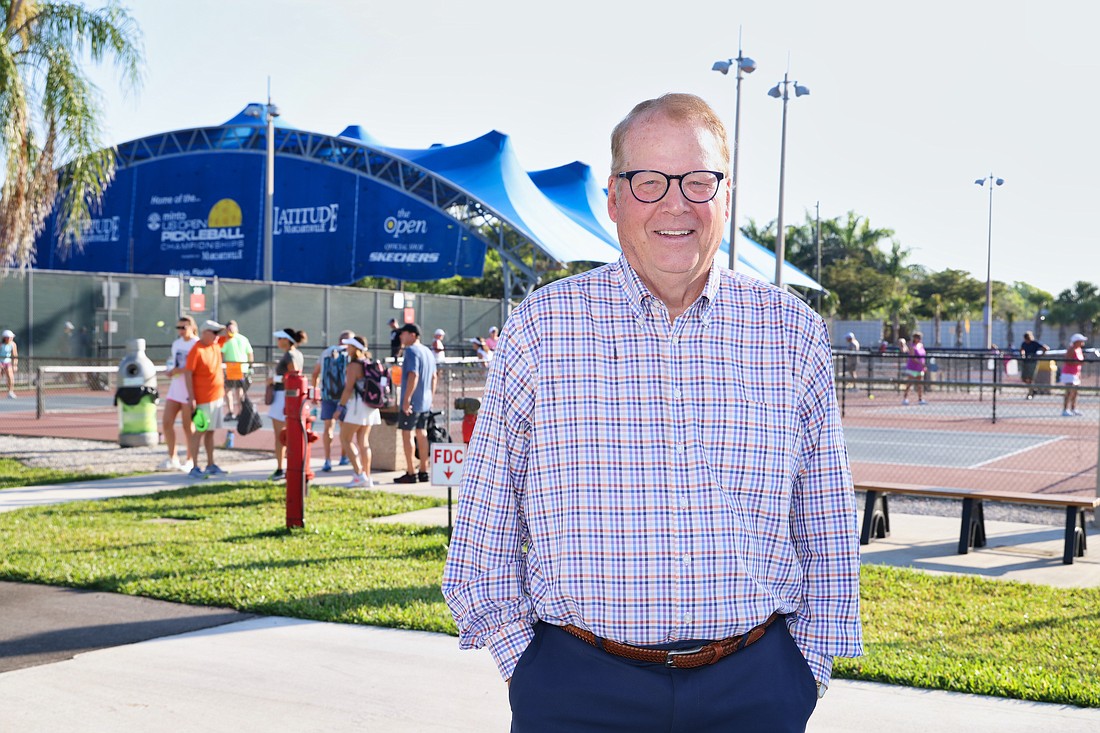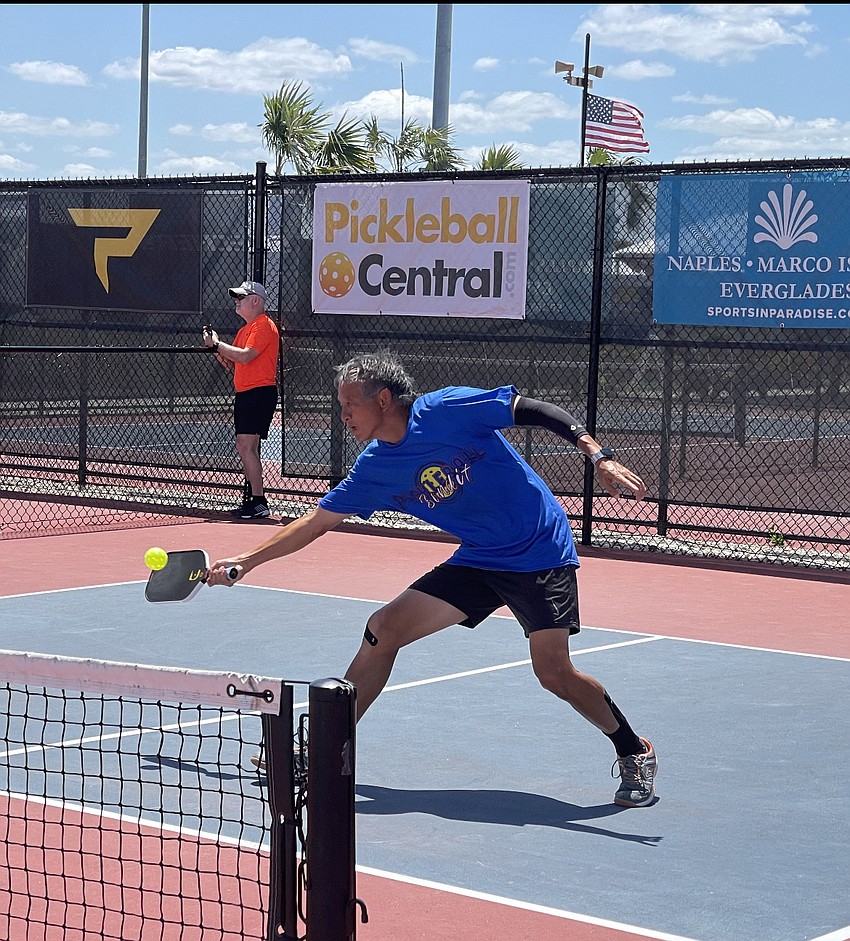- December 13, 2025
-
-
Loading

Loading

Bob Strommen is having a ball with pickles.
The financial services entrepreneur, motivational speaker and author has made it a mission in his later years — he’s 70 — to turn Naples into the pickleball capital of the world. So much so Strommen, managing partner of the Naples Pickleball Center, has trademarked the term Pickleball Capital of the World for the center, Naples and Collier County. He’s been digging and dinking to prove that ever since he took on the role, in November 2020. (In pickleball, a dink is a controlled shot into what’s considered the non-volley zone.)
“I told the staff when I got here that our goal is to look, smell and feel like the pickleball capital of the world,” he says. “And that’s what we’ve done here.”
Strommen took another big stride in that direction in mid-February, when he became the first franchise/team in the new National Pickleball League. The NPL, also based in Naples, is a team competition for Champions Division (Age 50+) professional pickleball players. Strommen’s team will be called the Naples JBB United — named for the first initials of the founders of pickleball: Joel Pritchard, Bill Bell and Barney McCallum, who created the sport in 1965 outside Seattle.
Naples JBB United is one of six teams in year one of the league. The schedule includes an NFL-styled combine for players in March in Oklahoma City; a draft for players in April; and competition starting in June.
Locations for the other five franchise teams, after Naples, haven’t been announced yet. Strommen declines to disclose the cost to buy a franchise team in the NPL, saying only his investment is in the six figures. He hopes to make money by selling sponsorships to local businesses, in addition to potential deals with TV and social media sites. “I wouldn’t be doing this if I didn’t think I could get the right financial return,” he says.
Strommen oozes pickleball passion. And his timing is spot on: pickleball, in the region, Florida and across the country, is certainly having a moment. There were 36.5 million pickleball players in the U.S. through August 2022, according to the Association of Pickleball Professionals. That’s up 630% from five million players in 2021. The sport has staying power, too. The 2023 APP Pickleball Participation report, in conjunction with a study from YouGov, found that more than 8.5 million people played pickleball eight times or more in the previous 12 months.
The onslaught of pickleball players is partially why Strommen is so confident in the new league, in which he has an ownership stake, in addition to Naples JBB United. The National Pickleball League joins Major League Pickleball in a league format. Age is one of the key differences between the leagues, Strommen says, with the NPL’s over 50 format making it like the PGA Tour Champions League in golf versus the PGA Tour.
Another big difference between the leagues? Major League Pickleball is a star-studded operation, at least in ownership groups. Names and entities with ownership stakes in teams include Anheuser-Busch; NBA stars Kevin Durant and Lebron James; Super Bowl champion Patrick Mahomes; Shark Tank stars and investors Mark Cuban and Robert Herjavec; model Heidi Klum and country singer Dierks Bentley.
While not in league format, some other entrepreneurs are also making progress with pickleball entities on the west coast of Florida.
One big example: real estate developer Brian McCarthy, a retired U.S. Navy rear admiral with an MBA from Harvard, co-founded the Sarasota-based Pickleball Club in 2019. McCarthy aims to build 15 indoor pickleball clubs, high-end facilities that will combine the sport with the social aspect, over the next four years across Florida.
The first Pickleball Club is expected to open in April, in Sarasota just outside Lakewood Ranch. Late last year the Pickleball Club announced the acquisition of a three-acre site in Fort Myers and the signing of a purchase agreement for a 5.5-acre site in Venice. Other clubs are in the works in Port St. Lucie and Bonita Springs.
McCarthy, speaking some five weeks before the scheduled debut of the first club, says the business opportunity stems from one core factor: demand, both to play the sport and to gather around it in social settings. “Pickleball is the most social sport I’ve ever seen,” McCarthy says.
The demand factor is being proven out, given some 2,000 people expressed interest in the debut club and 300 or so signed up for early memberships. (Memberships are $1,000 to join in a pre-opening phase, plus a $100 month in dues.)
The Pickleball Club in Sarasota, at 33,000 square feet on 2.4 acres, includes 12 indoor courts and two outdoor covered courts.. There’s also cameras covering every court for coaching and analysis, and there will be a cafe and retail store, among other features.
Each of the facilities in the Pickleball Club business model is templated, with some minor adjustments based on site. One of the biggest challenges, McCarthy says, is similar to many other development projects, in finding the right piece of land. “Acquiring the land for these projects is not as easy as people might think,” he says, due to zoning and other regulations.
The cost of each club to build is between $10 million and $12 million, making it a total investment of up to $180 million. McCarthy says he and his partner, New York investment banker Matt Gordon, have raised funds mostly from one-off private individuals, starting at investments of at least $100,000. The company is taking on some debt financing from banks, he adds, to cover real estate development costs. “There certainly is a lot of interest on the investor side,” McCarthy says.
Another entrepreneur looking to score with pickleball is Reuben Pressman, in St. Petersburg. Pressman, who previously founded and sold a software firm, Presence, which helped universities improve student retention rates, is in the early stages of the St. Pete Athletic Club. The club, according to its website, will be “Tampa Bay’s first indoor pickleball athletic club with food and beverage, open to all.” It will include nine indoor and seven outdoor courts.
Pressman, like McCarthy and Strommen, says his sense or urgency is pushed by demand outpacing supply. “We are definitely feeling the need for more pickleball courts,” in St. Petersburg, he says. “There’s not a lot of activity right now.”
Strommen, meanwhile, got into pickleball, and the NPL, as both an interested player and businessman. A onetime high school teacher and soccer coach, Strommen ran a financial services firm, Strommen and Associates, for 45 years in St Paul, Minnesota founded by his father. Strommen and his family have had a home in Naples for more than 35 years.
In relocating to Naples a few years ago, he quickly picked up pickleball and got to know the owners of the Naples Pickleball Center. Saying he thought “there was an opportunity being missed” to expand and do more, he approached the management company about it. By late 2020 he had created a management entity to take over the club, and he worked out a new deal with the landlord, Collier County. Now Strommen pays Collier County royalties, a percentage of revenue, for overseeing the club.
Strommen says he invested “a lot of money,” into the six figures, to upgrade the facilities, bring in new teachers, coaches and more.

Then, last year Strommen heard from a club member that another member, Michael Chen, former president of NBC News’ Strategic Initiatives Group, was putting together a 50-plus pickleball league. Strommen and Chen soon met over a beer to talk about the league. Strommen wanted in. “I am truly impressed with how much work the NPL team has done with building the vision and plan for the league,” says Strommen in a statement announcing the Naples team.
The NPL is scheduled to hold team competitions between June and September, and then a championship in October. Every NPL league match will take place at a Chicken N Pickle location; Chicken N Pickle is an indoor/outdoor entertainment complex with a restaurant, sports bar and pickleball courts, with a handful of locations in the Southwest and Midwest.
NPL competitions won’t be held in Naples in year one, but Strommen hopes to host future events in Southwest Florida. Competitions for the debut year will be held in Dallas, San Antonio, Glendale, Arizona and Overland Park and Wichita, Kansas. Year one prize money is $100,000.
Chen hopes to grow the league to 12 teams by year three. Eventually league officials hope to have 30 teams, but are cautious of growing too fast and diluting the talent pool for teams.
Chen, a onetime board member at The Weather Channel who also ran GE Capital’s Media, Communications and Entertainment unit from 2006 to 2010, is one of the driving forces behind the NPL. Co-founders include Beth Herr Bellamy, a former pro tennis player who competed for a decade on the WTA Tour and is now a No. 1 ranked pickleball player; Rick Witsken, who also played pro tennis and later turned to pickleball, where he also earned a No. 1 ranking; and Chen’s son Ryan Chen, who has an MBA from Stanford and has worked in sports media and marketing.
One advantage for the NPL, Chen believes, will come from its demographic focus of people over 50. The celebrity-driven leagues are going for the younger set and, he says, “the players over 50 are being abandoned.”
Chen says in the startup phase the league will make money to fund itself by selling team franchises. After that the business plan is to sustain the league through sponsorships, merchandise, licensing, events and media rights revenue.
The sponsor side revolves a big push to go to businesses in each team’s market. “If you don’t engage with the business community,” Chen says, “you’ll be out of business in three or four years.”